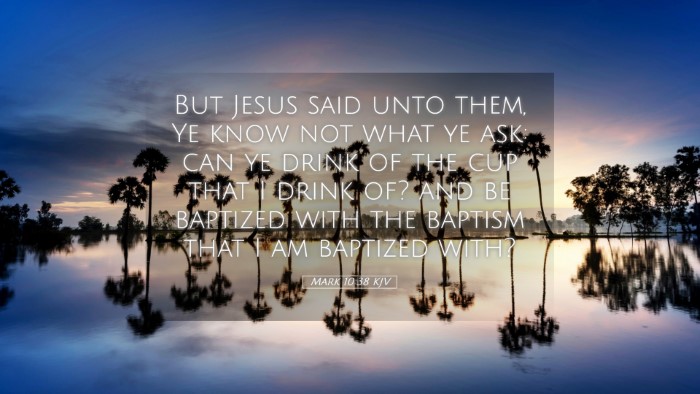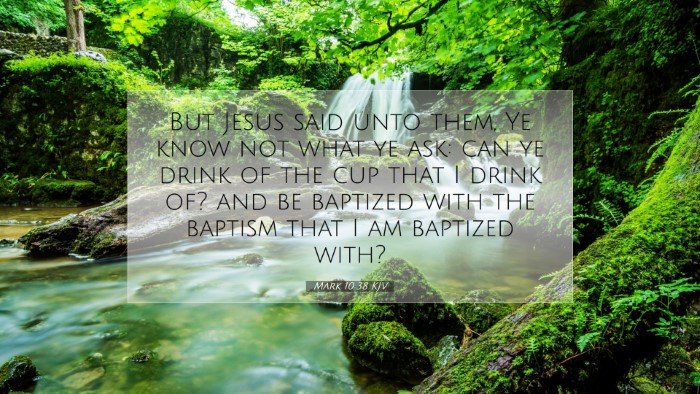Commentary on Mark 10:38
Verse Text: "But Jesus said to them, 'You do not know what you are asking. Are you able to drink the cup that I drink, or to be baptized with the baptism with which I am baptized?'" (Mark 10:38, ESV)
Introduction
The passage in Mark 10:38 provides profound insight into the nature of Christian discipleship and the challenges inherent in following Christ. In this commentary, we will derive understanding from renowned public domain commentaries by Matthew Henry, Albert Barnes, and Adam Clarke, focusing on Jesus’ response to the disciples' request for positions of honor and authority. This exploration aims to deepen the theological discourse and provide meaningful applications for pastors, students, and scholars.
Contextual Background
In the preceding verses, the context reveals an ambitious request made by the mother of James and John, who sought high positions in the coming kingdom of God for her sons. Jesus’ response is penetrating—highlighting not only the nature of leadership in His kingdom but also the cost associated with discipleship. The term “cup” and “baptism” carry significant theological implications, denoting suffering and the comprehensive initiation into the life and death of Christ.
Examination of Jesus' Question
“You do not know what you are asking.” This initial statement of Jesus underscores human ignorance regarding divine purposes. The request for greatness reflects a common misunderstanding about the nature of Christ's kingdom.
- Matthew Henry: Henry points out that the disciples sought worldly glory, failing to recognize that true greatness in God’s kingdom comes through servitude and suffering.
- Albert Barnes: Barnes emphasizes that the disciples were unaware of the trials and tribulations that Christ would endure and thus the nature of the request. They were blind to the spiritual implications of what true discipleship entails.
- Adam Clarke: Clarke notes that Jesus’ question serves to remind the disciples of the seriousness of their ambitions. Jesus positions their request within the larger context of His imminent suffering.
The Cup Jesus Mentions
When Jesus refers to "the cup," He is metaphorically speaking of His suffering and the divine wrath that would fall upon Him. This bright metaphor also resonates with the Old Testament, where the cup often represents God's judgment.
- Matthew Henry: He elaborates that this "cup" symbolizes the suffering and sacrifice that are integral to the redemptive work of Christ. Partaking in this cup signifies an alignment with Christ’s suffering for the sake of the gospel.
- Albert Barnes: Barnes notes how drinking from this cup involves participating in the sufferings of Christ—an essential aspect of the Christian experience. A proper understanding of this 'cup' is vital for any believer aspiring to leadership in Christ’s kingdom.
- Adam Clarke: Clarke states that the cup represents everything Jesus was about to endure—betrayal, crucifixion, abandonment. Acknowledging this call to share in suffering is a foundational principle for the disciples' future ministry.
The Baptism He Would Undergo
The phrase “baptized with the baptism” extends the metaphor of initiation into Christ’s suffering and mission. This baptism refers to the overwhelming nature of Christ’s forthcoming trials and tribulations.
- Matthew Henry: Henry describes the "baptism" as the total immersion of Jesus into suffering; it is not only a reference to His physical baptism but a spiritual and emotional overwhelming that would define His mission on earth.
- Albert Barnes: Barnes points out that this aspect of baptism refers to the complete identification Jesus would have with humanity's sin and its consequences. Thus, participation in His baptism implies accepting the sufferings tied to Christ’s mission.
- Adam Clarke: Clarke further suggests that this "baptism" also denotes the inauguration of Christ’s ministry and the consequential challenge believers face to fully identify with Him.
The Disciples' Response
The disciples boldly proclaim, “We are able,” reflecting their underestimation of the cost of following Jesus. This declaration is a telling insight into human ambition versus divine expectation.
- Matthew Henry: Henry critiques the boldness of the disciples, stressing their naïveté and the potential for pride that often accompanies human ambitions within the faith community.
- Albert Barnes: Barnes highlights the zealousness of the disciples but warns against entrusting too much merit on their capabilities without acknowledgment of the grace needed to endure challenges.
- Adam Clarke: Clarke asserts that this response underscores a vital truth in discipleship; it is God who equips and fortifies us in our trials, not our self sufficiency.
The Significance of Suffering in Discipleship
Suffering is a significant theme in the Christian narrative, and this passage encapsulates the harsh truth that following Jesus entails participating in His suffering. This notion can be a point of encouragement and a catalyst for spiritual growth.
- Matthew Henry: He asserts that through our suffering, we draw closer to Christ and are molded in His image, emphasizing that such trials are essential for spiritual maturity.
- Albert Barnes: Barnes adds that understanding the role of suffering is crucial for truly engaging in the mission of the church; it builds character and deepens faith.
- Adam Clarke: Clarke reinforces that by enduring hardship, believers demonstrate the authenticity of their faith and the power of Christ at work within them.
Conclusion
Mark 10:38 challenges believers to reevaluate their understanding of ambition, suffering, and leadership in the context of Christ’s ministry. In recognizing that true discipleship involves a willingness to endure hardship and share in the suffering of Christ, we are encouraged to live lives that exemplify sacrifice and service. This commentary serves as a reminder to pastors, students, and scholars that the call to follow Christ is both a privilege and an obligation—one that necessitates a deep reliance on God’s grace and power.


